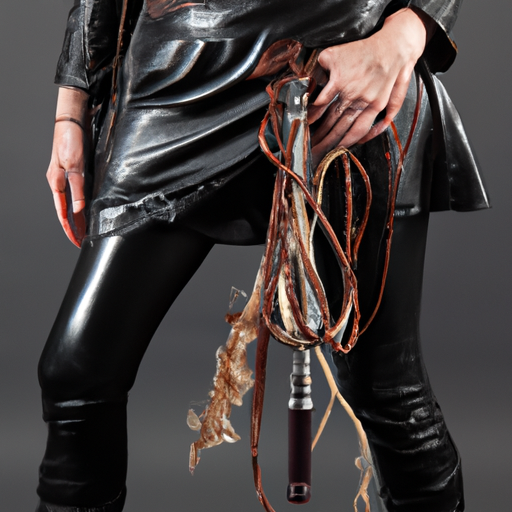In a society where racial stereotypes and biases continue to persist, it is essential to recognize and celebrate the voices and experiences of marginalized communities. One such community that challenges these stereotypes and biases is the world of black femdom. Black femdom, short for female dominance, is a subculture within BDSM (Bondage, Discipline, Dominance, Submission, Sadism, Masochism) that centers on black women taking on dominant roles in consensual power exchange relationships. While this subculture may seem unconventional to some, it provides a powerful platform for disrupting racial stereotypes and biases.

Historically, black women have been subjected to both gender and racial oppression, often being portrayed as hypersexualized objects or submissive individuals. These harmful stereotypes have perpetuated a narrative that undermines the strength, agency, and autonomy of black women. However, black femdom challenges these narratives by redefining power dynamics and reclaiming control over their bodies and identities.
One of the ways in which black femdom challenges racial stereotypes is through the subversion of traditional gender roles. In mainstream media, black women are often portrayed as hypermasculine or overly sexualized, perpetuating the ‘Jezebel’ stereotype. Black femdom, on the other hand, allows black women to assert their dominance and power, challenging the notion that they can only exist within predefined societal roles. By embracing their sexuality and asserting their dominance, black women in the world of femdom reclaim their agency and challenge the narrow expectations placed upon them.
Moreover, black femdom challenges racial biases by promoting the idea of consent and communication. In a BDSM relationship, consent is of utmost importance, and boundaries are established through open and honest communication. This emphasis on consent and communication serves as a powerful counter-narrative to the historical objectification and dehumanization of black women. Black femdom emphasizes the importance of consent and communication, highlighting the agency and autonomy of black women in their sexual and intimate relationships.
The subculture of black femdom also provides a platform for black women to explore and embrace their sexuality on their own terms. By engaging in consensual power exchange dynamics, black women challenge societal expectations and reclaim their sexual autonomy. In a world that often hypersexualizes black women, black femdom allows individuals to explore their desires, preferences, and boundaries in a safe and consensual environment.
Furthermore, black femdom challenges racial stereotypes and biases by fostering a sense of community and support. Through online platforms, forums, and events, black femdom allows individuals to connect and share their experiences, creating a supportive network that celebrates their identities. This sense of community provides a space for black women to uplift and empower each other, challenging the narrative of competition and division that is often perpetuated by racial biases.
In conclusion, black femdom serves as a powerful force in challenging racial stereotypes and biases. By subverting traditional gender roles, promoting consent and communication, embracing sexual autonomy, and fostering community, black femdom empowers black women to confront societal expectations and reclaim their identities. It provides a space where black women can assert their dominance, challenge harmful narratives, and celebrate their strength and agency. Through the exploration of black femdom, we can continue to challenge societal norms and foster a more inclusive and accepting society for all. Click here for more info.
Are there any ethical concerns regarding the portrayal of lesbian BDSM in media and entertainment?
In recent years, media and entertainment have made significant strides in representing diverse communities and exploring various aspects of human sexuality. One such portrayal that has gained attention is the depiction of lesbian BDSM (Bondage, Discipline, Dominance, Submission, Sadism, and Masochism) in popular media. While the increased visibility is seen as a positive step towards inclusivity, it is essential to examine the ethical concerns associated with this portrayal.
First and foremost, it is crucial to acknowledge that BDSM, when practiced consensually between adults, is a valid and legitimate form of sexual expression. It is not inherently unethical, as long as all parties involved give informed consent and establish clear boundaries. However, the portrayal of lesbian BDSM in media can raise concerns regarding its accuracy, stereotypes, and potential harm.
Accuracy is a significant ethical concern when it comes to media portrayals. BDSM is a complex and nuanced practice that requires a deep understanding of consent, negotiation, and safety protocols. Misrepresentations or oversimplifications can perpetuate harmful stereotypes and misconceptions, leading to misunderstandings and misinterpretations among viewers. It is crucial for media creators to consult with individuals within the BDSM community to ensure accurate and respectful portrayals.
Another ethical concern is the potential for stereotypes to emerge from these portrayals. Media has a history of sensationalizing BDSM, aligning it with violence or deviant behavior. Portraying lesbian BDSM in media can perpetuate harmful stereotypes about both lesbian and BDSM communities. It is essential to depict these relationships and practices in a way that respects the diversity and complexity within these communities, avoiding harmful generalizations or fetishization.
Furthermore, media has a powerful influence on society, shaping attitudes and perceptions. The portrayal of lesbian BDSM in media can potentially impact public opinion, both positively and negatively. It is crucial to consider the potential harm that inaccurate or sensationalized portrayals can cause, particularly for individuals who may already face marginalization or discrimination. Media creators must be mindful of the impact their work can have and strive to represent diverse experiences responsibly.
Consent is a fundamental aspect of BDSM, and any depiction of BDSM in media should emphasize the importance of informed consent and communication. It is essential for media creators to portray scenes that clearly demonstrate the negotiation and establishment of boundaries. By doing so, they can educate viewers about the importance of consent and encourage healthy discussions around sexuality and relationships.
Finally, it is essential to recognize that media portrayals of lesbian BDSM can have varying impacts on different individuals. Some may find it empowering and validating to see their experiences represented, while others may feel uncomfortable or objectified. The ethical responsibility lies with media creators to strike a balance that respects the diversity of audience perspectives and ensures that the portrayal is not exploitative or harmful.
In conclusion, the portrayal of lesbian BDSM in media and entertainment raises ethical concerns that require careful consideration. Accuracy, stereotypes, potential harm, and consent are all important aspects to be mindful of when depicting such relationships and practices. By approaching this topic with sensitivity and respect, media creators have the opportunity to promote understanding, challenge stereotypes, and create narratives that contribute positively to the representation of diverse sexualities and relationships in popular culture.
